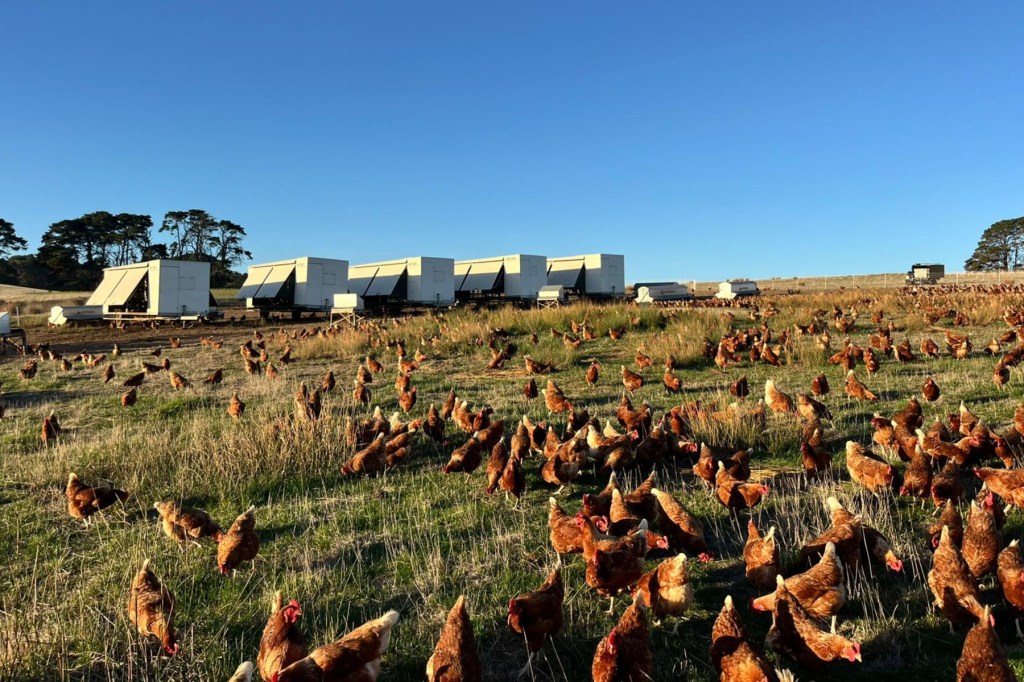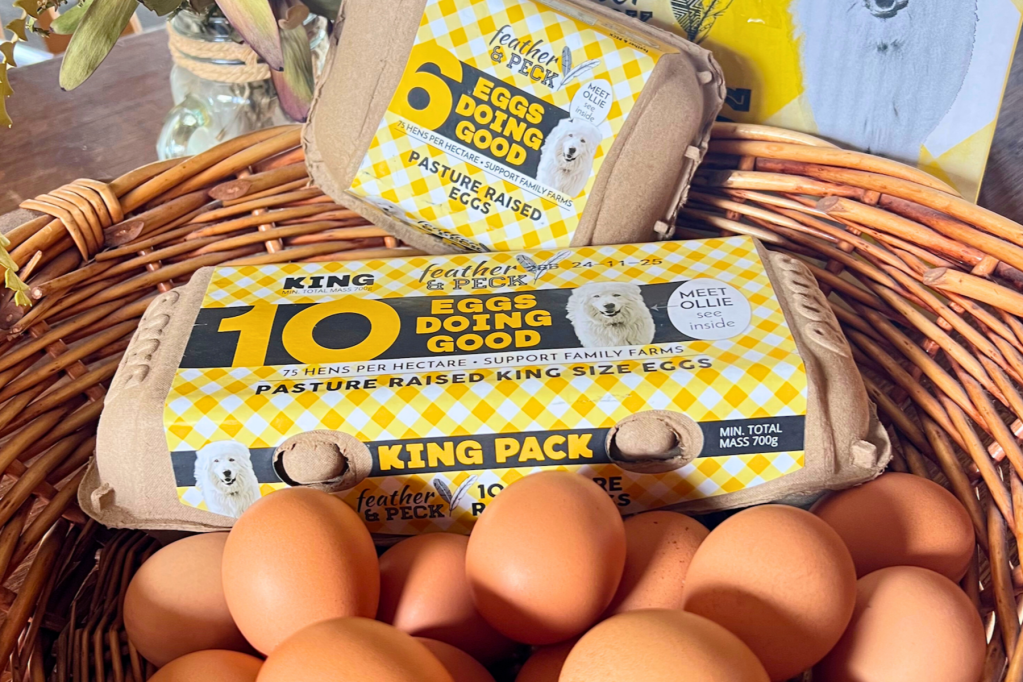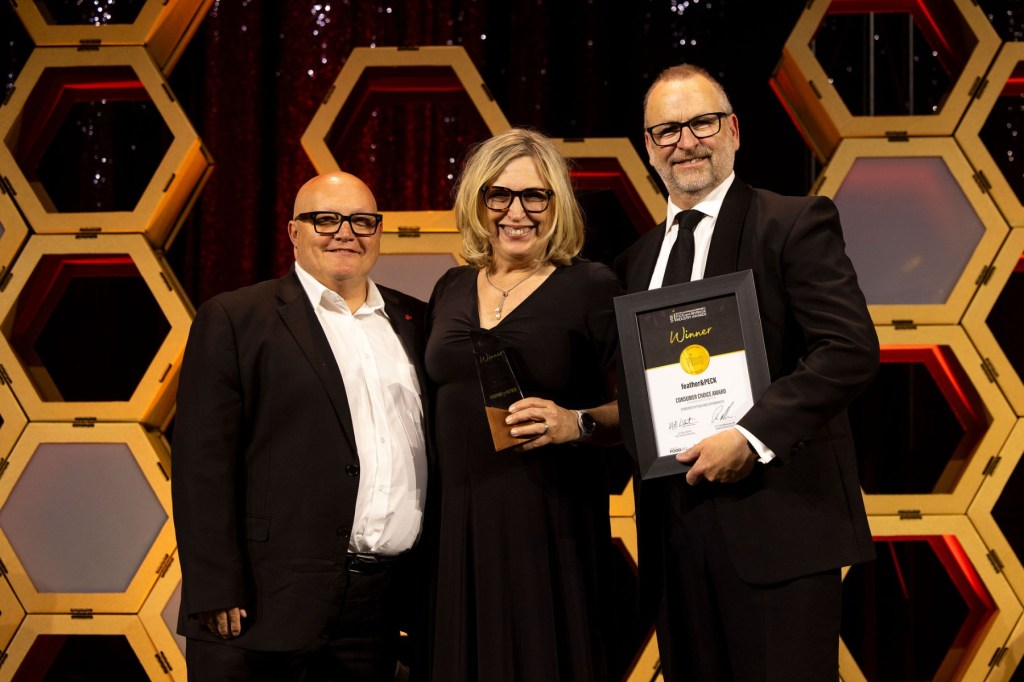Pasture-raised, plate-perfect: SA egg producer cracks state awards
Feather&PECK has secured the 2025 Consumer Choice Award, a testament to South Australians recognising the value of true pasture-raised eggs crafted through regenerative farming and uncompromising hen welfare.

When Catriona and John Byrne started Feather&PECK almost a decade ago, they didn’t set out to win awards. They simply wanted to produce an egg that tasted the way an egg should taste – one that came from family farms rather than large sheds, from hens that spent their days on fresh pasture instead of dirt, and from a system that nourished animals, farmers, soil and communities in equal measure.
This month, that quiet philosophy cracked wide open.
Feather&PECK was the proud winner of the Consumer Choice Award for businesses with fewer than 15 full-time employees at the 2025 South Australian Premier’s Food and Beverage Industry Awards – an honour voted entirely by the public. After four years in the top 20, the family-run operation finally claimed the coveted prize ahead of products like cheese, biscuits and bakery items.
“2025 has been the year of the egg – starting with scarcity and now experiencing plentiful supply,” co-founder Catriona Byrne says. “It seems right for the humble egg to win the consumer award.”
Catriona may call it “humble,” there’s nothing simple about the journey these eggs take to reach South Australian plates.
Feather&PECK began with two family farms. As the brand gained traction, the Byrnes and business partner Ian Anderson expanded slowly and intentionally. Today, seven regenerative family farms across the Fleurieu Peninsula produce the eggs that fill Feather&PECK’s distinctive yellow check cartons.
You might like

At the centre of it all is one principle that shapes every decision: good eggs come from real regenerative farms, not factories. “A good egg is something to be cherished,” Catriona says.
The difference is obvious long before the eggs are cracked. Feather&PECK hens roam at a density of no more than 150 birds per hectare – a fraction of the numbers commonly found in large-scale systems. The birds are moved to new pasture every week, a level of care that requires hands-on work, co-ordination and constant attention.
“The hens are moved every week with tractors and fenced by portable electric fencing,” John explains. “The eggs are collected daily on-farm by hand, transported to our grading and packing facility in Willunga, then packed into our distinctive yellow vans to be delivered to stores. There are a lot of moving parts.”
Many consumers imagine free-range hens pecking through green grass year-round, but Catriona is quick to point out how rare that is in practice.
“Unless you actually move hens weekly, they will decimate the pasture or the ground they’re on within a few days,” she says. “They’re on dirt in summer and mud in winter. There’s not much grass going on.”

Feather&PECK’s rotational approach ensures the birds spend their lives on living pasture, not barren earth. It also means the soil benefits from the hens’ natural behaviour. “What other egg producers may treat as waste, we use directly on the soil,” Catriona says.
A weekly move means manure is spread evenly across paddocks, feeding the soil biology that makes regenerative farming work. Over time, each farm becomes more productive, more resilient and more environmentally sound.
But the regeneration doesn’t stop with the soil. The model offers regular income for local farmers, employment opportunities within the Willunga-based packing facility, and economic benefits that stay within the region.
Even South Australian chefs have embraced the difference. “Chefs love our eggs,” Catriona says, noting they are especially popular in dishes where the egg is the hero, from the perfect poach to handmade pasta.
Transparency is central to the Feather&PECK identity. Each year, as part of the Fleurieu Food Festival, the Byrnes open their gates for farm tours, inviting the public to see exactly what goes into producing a true pasture-raised egg.
Visitors walk the paddocks, meet the hens, see the Maremma dogs guarding the flocks, and understand for themselves why Feather&PECK charges a premium for premium eggs. As Catriona puts it: “We are a farm-first company. We charge a premium for premium eggs because it’s important to pay our farmers as much as we can.”

For Feather&PECK, winning a consumer-voted award isn’t just about producing excellent eggs – it’s about connection.
“To win that award, we needed to engage with our customers and tell our story,” Catriona reflects. “We needed to leverage their understanding of why our eggs are so good and what good the eggs do – for the soil and pasture, for hen welfare and local family farms prospering and thriving.”
The public response shows that South Australians increasingly want their grocery choices to mean something. They want real food, real stories and real impact.
“We always have a choice of what food we buy,” Catriona says. “When you choose to buy a Feather&PECK egg, you’re choosing to support family farms, you’re choosing to regenerate soil, you’re choosing to support hen welfare and local employment. It’s not just any egg; it’s an egg doing good.”
Feather&PECK eggs are available across South Australia at supermarkets, greengrocers, butchers and select cafés and restaurants.












